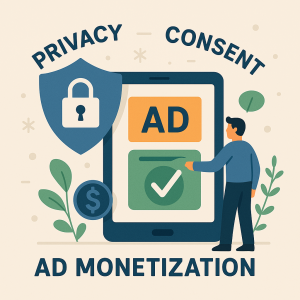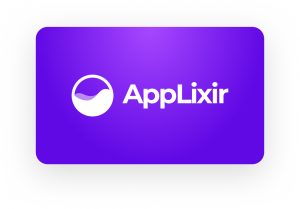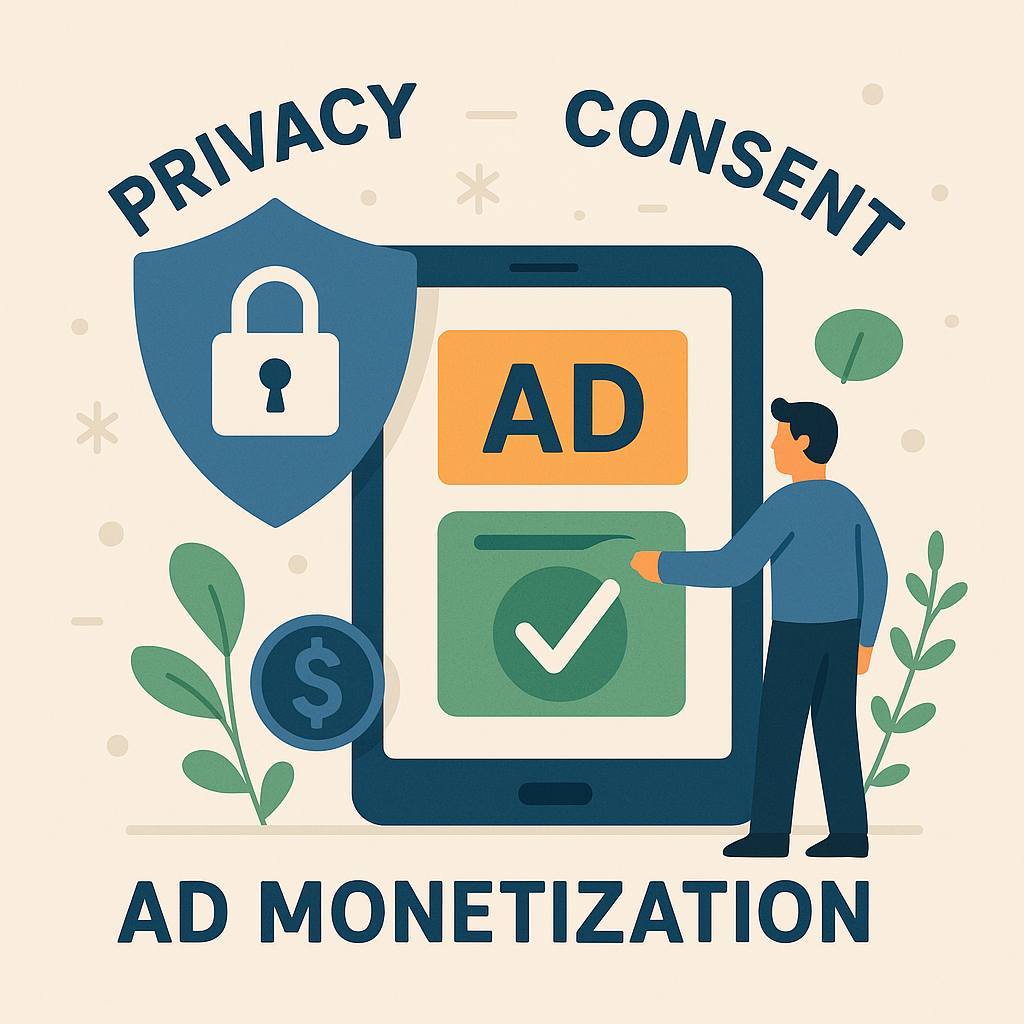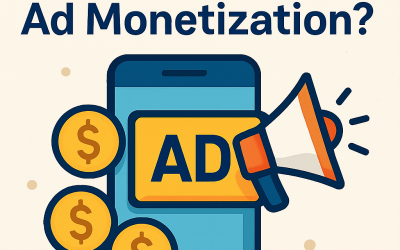Privacy-First Ad Monetization: how Consent Impacts Ad Revenue
In the evolving world of digital content, ad monetization remains a critical revenue stream for mobile apps, games, and websites. However, the rise of global privacy regulations has fundamentally changed how data can be collected and used. With laws like the General Data Protection Regulation (GDPR) in the EU and the California Consumer Privacy Act (CCPA) in the US, advertisers and developers face increasing pressure to adopt privacy-first strategies.
The core challenge lies in balancing two competing needs: ensuring regulatory compliance while maximizing ad revenue. As privacy requirements tighten, developers must rethink how they implement rewarded video ads, manage user data, and track engagement across platforms. The key to this balancing act is user consent—how it’s obtained, stored, and respected throughout the ad delivery process.
Surprisingly, when approached the right way, consent management can enhance rather than hinder monetization. In this article, we explore how smart consent strategies impact CPM, fill rates, and rewarded video ads performance—all while building user trust and long-term monetization success.
Contents
- 1 The Rise of Privacy Regulations and What It Means for Monetization
- 2 Why Consent Matters in Ad Monetization
- 3 How Rewarded Video Ads Can Thrive with Consent
- 4 Implementing a Consent Management Platform (CMP)
- 5 Best Practices for Privacy-First Monetization
- 6 What Happens When You Skip Consent?
- 7 Case Study: Boosting ARPDAU Through Consent Optimization
- 8 AppLixir Monetization & Consent Managment
The Rise of Privacy Regulations and What It Means for Monetization
The last few years have seen an unprecedented rise in privacy-focused legislation. The introduction of GDPR in 2018 was a seismic event, setting a global standard for user data protection. It mandates that any business collecting personal data from EU residents must obtain clear, affirmative consent before doing so.
Shortly after, the CCPA (and now CPRA) was introduced in California, granting users rights to opt-out of data sales, request data deletion, and know what information is collected. Brazil’s LGPD, Canada’s PIPEDA, and upcoming frameworks in India and Southeast Asia are following suit.
These laws impact programmatic advertising, where real-time auctions rely heavily on user identifiers and behavioral data. Without proper consent, much of that targeting ability is lost. That means advertisers offer lower bids, and CPMs plummet. For developers depending on ad monetization, the financial hit can be significant.
On top of legal risks (including fines up to 4% of global turnover under GDPR), there’s also the reputational fallout. Privacy is now part of brand perception. A developer seen as reckless with user data risks losing not just revenue—but users altogether.
For those asking, “What is monetization in the privacy age?”—the answer is no longer just about ad formats. It’s about building compliant, consent-driven systems that unlock the full potential of mobile advertising platforms without violating trust.
Why Consent Matters in Ad Monetization
Consent isn’t just about checking legal boxes—it’s a direct driver of ad performance.
When users opt-in, publishers gain access to key data such as:
- Advertising IDs
- Location data
- Behavioral tracking
- Retargeting capabilities
This data is critical for targeted advertising, which significantly boosts eCPM (effective cost per thousand impressions) and fill rates. When users decline consent, ad networks often revert to contextual ads, which have lower value and fewer buyers.
For example, a major mobile gaming network reported that non-consented traffic generated 25–40% less revenue than consented impressions. Similarly, Demand-Side Platforms (DSPs) often exclude or deprioritize inventory without valid consent strings.
Let’s break it down:
- Ad Exchanges filter requests that lack consent metadata
- CPM drops because targeting is less precise
- Revenue decreases due to lower competition in auctions
That’s a triple threat to your monetization efforts. However, if you secure consent early—and do it well—you unlock better bidding, more ad variety, and higher ad revenue.
How Rewarded Video Ads Can Thrive with Consent
Among all ad formats, rewarded video ads are best positioned to succeed in a privacy-first world. They naturally align with user-centric values and legal compliance.
Here’s why:
- The user initiates the ad experience voluntarily
- There’s a clear value exchange (watch ad = get reward)
- Users retain control, as they can opt-out at any time
Because of this, rewarded video ads fulfill the legal definition of “informed, unambiguous consent.” They’re not just compliant—they’re preferred.
And the performance backs it up:
- Completion rates often exceed 80%
- Click-through rates (CTR) and post-view conversions are significantly higher than interstitials
- Publishers report up to 2x eCPM compared to static formats
Even better, rewarded advertisements in games lead to increased session length and retention rates. This improves LTV (lifetime value) metrics and boosts overall monetization.
A video monetization platform that integrates with a proper Consent Management Platform (CMP) allows developers to optimize this format while ensuring compliance. For incentivized ads, consent becomes part of the UX—not a barrier.
In short, rewarded video ads represent the sweet spot between revenue and respect.
Implementing a Consent Management Platform (CMP)
To scale privacy-first ad monetization, a CMP is essential. It acts as the infrastructure for collecting and storing consent choices while ensuring those preferences are respected across your monetization stack.
A robust CMP allows you to:
- Customize consent prompts based on geo-location
- Collect granular user preferences (e.g., analytics vs marketing data)
- Generate consent strings compliant with IAB’s TCF v2.2
- Pass those signals to ad networks, DSPs, and SSPs
Popular CMP solutions include:
- Didomi.io: Compliance-focused with robust reporting (Note: AppLixir partners with Didomi CMP and provide consent via our platform)
- OneTrust: Enterprise-grade and widely adopted
- Quantcast Choice: Free and developer-friendly
- TrustArc: Compliance-focused with robust reporting
- Sourcepoint: Offers A/B testing and monetization optimization
If you develop HTML5 games or use Unity Monetization, pick a CMP with SDKs or JavaScript integrations that don’t interfere with gameplay or loading speeds.
Your website monetization platform should integrate CMPs into your header bidding wrappers, ensuring that consent strings are passed into bid requests in real time.
When implemented right, a CMP becomes a performance driver—not a speed bump.
Best Practices for Privacy-First Monetization
Building a privacy-first monetization strategy isn’t just about tools—it’s about UX and transparency.
Here are best practices that make a real difference:
- Simple UI/UX: Avoid complex language. Use icons, toggles, and clear call-to-actions.
- Granular Choices: Let users control individual data types (e.g., analytics, personalized ads).
- Geo-Targeting: Use IP-based logic to show appropriate consent flows (GDPR for EU, CCPA for California, etc.).
- Preload Consent: Don’t delay consent collection. Ask at first app open or site visit.
- Persistent Controls: Allow users to revisit and change preferences easily.
- Quarterly Audits: Check for expired consents, broken integrations, or inactive vendors.
When done right, consent becomes part of your monetization strategy. Users who trust your process are more likely to engage with rewarded ads, install apps, and return for more.
Combine this with monetization tools like ad revenue calculators, LTV predictors, or A/B testing platforms, and you create a data-driven system that maximizes both compliance and profitability.
What Happens When You Skip Consent?
Neglecting consent—or implementing it poorly—has dire consequences.
Here’s what happens:
- Ad Quality Drops: DSPs avoid non-compliant impressions
- Revenue Shrinks: Lower fill rates and CPMs kill profitability
- Blocklisting Risk: Google, Meta, and other ad exchanges may block your app
- Legal Trouble: GDPR fines have reached €20 million+ in high-profile cases
- Brand Reputation Deteriorates: Users lose trust and uninstall apps or bounce from sites
Even if you get lucky avoiding penalties, you’ll miss out on high-value campaigns, programmatic demand, and cross-channel attribution—which are crucial for high-performance mobile game monetization models.
Bottom line: ignoring privacy is not an option. It’s a revenue killer, not just a legal risk.
Case Study: Boosting ARPDAU Through Consent Optimization
Let’s look at a real-world example:
A gaming studio with a freemium puzzle app was struggling with monetization. Their ARPDAU (Average Revenue Per Daily Active User) had dipped below $0.05, and their eCPMs were inconsistent across markets.
Upon review, they discovered:
- Their consent screen was buried in settings, not shown on startup
- Their CMP only triggered in the EU, missing CCPA users in the U.S.
- Vendors weren’t receiving proper consent strings, limiting bidding
They overhauled their consent UX:
- Added a full-screen opt-in at first launch
- Implemented a modern CMP with TCF 2.2 support
- Explained ad benefits clearly (e.g., “Ads help us keep the game free”)
- Offered region-based customization and persistent controls
After 60 days, results were dramatic:
- 30% increase in global consent rate
- 21% boost in rewarded video ad revenue
- 15% higher ARPDAU
- Improved user retention in markets with strict privacy laws
The takeaway? Optimizing consent isn’t a compliance chore—it’s a growth strategy.
AppLixir Monetization & Consent Managment 
As the digital ecosystem becomes more privacy-conscious, the intersection of user trust and ad monetization is where the future lies. Developers who proactively adapt to changing regulations and rising user expectations won’t just survive—they’ll thrive.
At AppLixir, we’ve integrated Didomi as our preferred Consent Management Platform (CMP) to help publishers navigate global privacy requirements with ease. Didomi’s CMP is fully compliant with GDPR, CCPA, and other major data protection laws, offering a customizable, user-friendly interface that doesn’t interrupt the player experience. It integrates seamlessly with our rewarded video ad technology, ensuring that consent signals are passed correctly to demand partners, ad exchanges, and DSPs. For publishers, this means better eCPMs, higher fill rates, and complete confidence that your ad monetization strategy is privacy-compliant—without sacrificing revenue.
Whether you’re monetizing through rewarded video ads, HTML5 games, or in-app advertising, it’s time to treat consent as a core part of your monetization strategy. A clear, respectful, and legally sound consent process drives better CPMs, higher fill rates, and more engaged users.
In a world where data is currency, trust is the vault. Secure it—and your revenue will follow.
Ready to monetize your game or website without compromising on user privacy? Check out our privacy-compliant Rewarded Video SDK—designed for Unity, HTML5, and web platforms. Want to see how consent affects your ad income? Use our free Ad Revenue Calculator to compare projected CPMs and eCPMs with and without consent.



